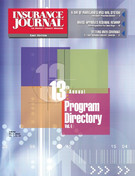While a number of insurance companies have exited the program business in recent years, program administrators heard from a few carriers recently that appear willing to at least consider new proposals.
During a panel at the recent annual meeting of the Target Markets Program Administrators Association, in Tempe, Ariz., representatives from ACE Westchester Specialty, Zurich Programs, GE Insurance Solutions and Darwin Professional Underwriters defined their appetite for entertaining new programs.
“We like this segment of the marketplace,” said Robert Gaffney, president of ACE Westchester Specialty. Gaffney said that his company “is open for business” and hopes to double its current $250 million in program business within the next five years.
Gaffney says his company’s capacity is steady for the next five years and if he sees a good program that will turn a profit, he would do it. “We’ll do any program that meets the criteria.”
As promising as that sounded to the program managers, they quickly learned that ACE, like most insurers, takes a “very disciplined approach” in approving programs so that only two or three out of a proposed 150 new programs are approved each year.
In her presentation to the Target Market audience, Margaret Zechlin of GE Insurance Solutions began by joking that every time she has been to a target markets meeting, her company has had a different name. GE Insurance Solutions is formerly Employers Re.
GE Insurance Solutions will take on only three to four new programs a year, preferring those that are close to $10 million minimum. “We look for a niche within a niche,” she explained, further characterizing their interest as programs that “drill-down” into markets. They are not looking for any auto insurance programs and have some reservations about workers’ compensation.
Responding to an inquiry about the appetite for start-up programs, Zechlin acknowledged that her division is currently looking at two possible beginner programs but that this is unusual. Start-ups with existing program managers have the better shot at being considered, she noted.
According to Jino Masone, executive vice president of strategic partnerships with Zurich Programs, while the insurer also has other program units, his division tries to bring a “best practices” approach to all programs in all of its divisions and serve as a single point of entry. Masone described himself as an “opportunity manager” who wants to improve his unit’s consistency and create true marketing effectiveness. “We don’t promise more than we can deliver.”
Masone said that capacity is not really an issue for Zurich but that it weighs new ideas on a case-by-case basis and considers a program manager’s expertise in its evaluation. Zurich is establishing a workers’ comp program capability that will be “very selective,” he added.
As chief executive of his relatively new Darwin Professional Underwriters, Steven Sills acknowledged that his capacity to write programs is less than that of the larger firms. But the door is open. Darwin, which was founded in May 2003, is looking for “loose bricks” to exploit, Sills said.
While the focus was on what makes a good program, futurist Edie Weiner of Weiner Edrich Brown Inc. prompted panelists to touch on experiences with program failures.
Gaffney shared the example of a program that fell victim to reinsurance rates after Sept. 11 and that despite attempts could not be fixed. “When a program goes bad, it’s like a divorce, everyone gets hurt,” Gaffney said.
Masone spoke of a program that was with a very large and well-known brand that failed because Zurich was “seduced” by the manager’s supposed marketing prowess. When it became clear that this marketing prowess did not extend to insurance, and the program manager would not listen to Zurich on how to get it right, the company severed its ties.
Zechlin shared that experience has taught her it’s not a good idea when one line within a program subsidizes another.
In terms of when and why programs switch carriers, panelists offered that it is very rare for a profitable program to leave one carrier and go with another. But current consolidation within the industry does present some opportunities for programs to migrate, noted Art Seifert, Target Markets president and founder of The Lighthouse Companies.
Topics Carriers
Was this article valuable?
Here are more articles you may enjoy.


 Insurance Broker Stocks Sink as AI App Sparks Disruption Fears
Insurance Broker Stocks Sink as AI App Sparks Disruption Fears  Zurich Insurance Profit Beats Estimates as CEO Eyes Beazley
Zurich Insurance Profit Beats Estimates as CEO Eyes Beazley  State Farm Adjuster’s Opinion Does Not Override Policy Exclusion in MS Sewage Backup
State Farm Adjuster’s Opinion Does Not Override Policy Exclusion in MS Sewage Backup  Florida Regulators Crack the Whip on Auto Warranty Firm, Fake Certificates of Insurance
Florida Regulators Crack the Whip on Auto Warranty Firm, Fake Certificates of Insurance 


